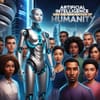In this piece, the author argues that artificial intelligence is fundamentally reshaping what it means to be human. Rather than simply being a powerful tool, AI is presented as a force that challenges our identity, our values, and even our place in the universe. The writer suggests that humanity is entering a new evolutionary phase — not biological, but cognitive — where machine intelligence blends with human purpose.
According to the author, AI is accelerating the democratization of creativity and problem-solving. People who were once limited by their technical skills can now express ideas, write, design, and innovate using AI as a collaborator. This shift lowers traditional barriers and invites a broader, more diverse set of minds to participate in building the future.
However, the article also raises serious ethical and existential concerns. As AI takes on more roles once reserved for humans — decision-making, moral reasoning, even companionship — there's a risk that we might outsource not just work, but meaning itself. The author warns that without intentional design and moral reflection, we could lose touch with the qualities that define our humanity.
In conclusion, the piece calls for a new kind of responsibility: one where we co-create with AI, not just use it. It’s not enough to build more intelligent machines — we must also build wise systems, aligned with human flourishing. The future, as the author sees it, is not about surrendering to AI, but about evolving together.


